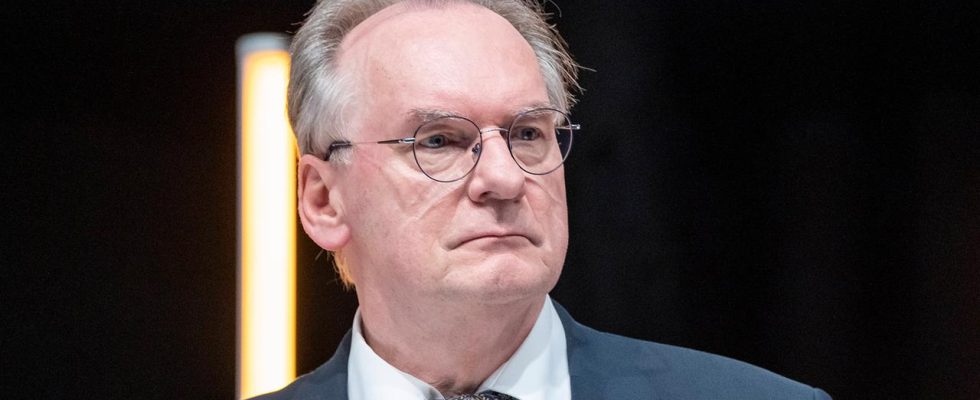In Wittenberg, politicians are arguing with citizens about the consequences of the Ukraine war. Saxony-Anhalt’s head of state Haseloff reprimands the traffic light. Federal Development Minister Schulze calls for a new debate on conscription.
“After Putin’s attack on Ukraine: what do we do? Are we ready to act?” A video player asks that with some pathos. The Munich Security Conference is touring through Germany and is stopping off in Lutherstadt Wittenberg this Wednesday evening. One wants to discuss the turning point proclaimed by Chancellor Scholz. Development Minister Svenja Schulze (SPD) and Saxony-Anhalt Prime Minister Reiner Haseloff (CDU) represent politics.
The venue already breathes a new era. Cavalry used to practice in the emperor’s parade hall. Later, the Red Army billeted. After their departure, the walls in the city center stood empty for a long time.
worried about escalation
Christoph Heusgen, head of the Security Conference, recalls Luther and the Wittenberg Blacksmith Action, a milestone in the GDR peace movement. But it is Marc Rath, editor-in-chief of both large regional newspapers in Saxony-Anhalt, who notes that when the intro claims that “the connection to the West gave us strength,” then that is only true for part of Germany. That doesn’t work here, says Rath.
In fact, strength and confidence are still sought. Anne Gidion from the Evangelical Church says that the turning point is encountering a “thin-skinned” and “exhausted” society.
presenter and MDREditor-in-Chief Julia Krittian brought figures from a survey for the evening. 93 percent of the participants from Saxony, Saxony-Anhalt and Thuringia worried about an escalation of the war. The figures are not representative, but give an impression of the mood.
Many questions from the audience are aimed at Russia. How do you bring a nuclear power to task? Heusgen begins: “Remember the Soviets in Afghanistan. What protects us from Russian hypersonic missiles? That Ukraine is not a NATO member.” Germany will not be drawn in, says Heusgen.
The ex-Merkel adviser helped negotiate the Minsk agreement. The “war criminal” Putin “kicked it in the bin”. Heusgen disagrees with Reiner Haseloff about how partly to blame Ukraine for the failure of the agreement.
Should we continue to help with arms deliveries or not? Heusgen, who was last in the question also open to fighter jets showed, finds yes, but otherwise holds back. It would also be difficult for him to assert himself here. “One is guilty in both cases,” says church representative Gidion. There are no good and bad dead. Applause.
A different emotionality
Some questions are presented with anger, others with conspiracy narratives. Haseloff tries to objectify. The people in East Germany have “a different emotionality when it comes to the question of who is friend and who is enemy.”
And even during the Cold War, the danger of a nuclear war was more present east of the wall than in the west. West Germans went carefree on vacation in Italy. “We wanted to have that too and now we want to keep it,” says Haseloff.
He himself draws different conclusions as far as the solution to the war is concerned: Anyone who has won their freedom themselves cannot stand up and tell Ukraine “that one should sacrifice oneself there”. Only Ukraine can decide on negotiations.
grumbling from some in the hall. There is no unanimous opinion here. Many others applaud when Heusgen says Russia has simply proven “unreliable.”
Schulze wants conscription debate
The current effects on life in Germany, inflation, energy crisis, come rather briefly. There are friction points here. The horror scenarios for the winter did not materialize, says Schulze. “We managed to replace the gas.”
Haseloff replies that gas storage tanks are only full today because large consumers have been shut down. He means plants like the local nitrogen works, which to this day only produce at half capacity. The federal government should pay more attention to industry “instead of dismantling heating systems”. He criticizes how the dispute over the building energy law was carried out by traffic lights.
Now Schulze can counter. The traffic light is “forced to work much faster and much more closely” than the Union and SPD once did. Now you have to “create parallel” climate change and energy crisis.
A pensioner wants to know what happened to the suspended military service. “I think we need to discuss this again,” said Federal Minister Schulze. However, their justification has little to do with the turning point: As a parliamentary army, the Bundeswehr must “represent the whole of society,” said Schulze. She is currently not doing that.
It remains an evening that would be difficult to pack into a crisp video trailer. The big, common approach, the story for the turning point: you are still being sought.

